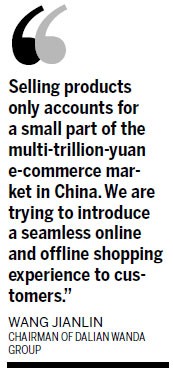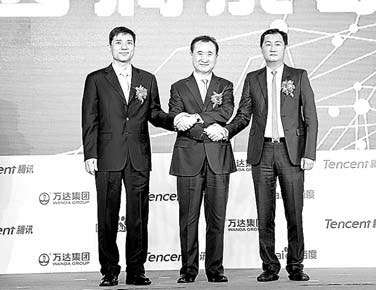Titans join hands to take on Ma
Updated: 2014-09-29 06:57
By Meng Jing(China Daily USA)
|
|||||||||
Jack Ma, chairman and co-founder of Alibaba Group Holding Ltd, seems to be feeling on top of the world at the moment, and not without reason. He has just been listed as China's richest individual, and his e-commerce conglomerate has made its debut on the New York Stock Exchange as the largest IPO in history.
His Hangzhou-based Alibaba is the dominant player in China's large and still rapidly growing e-commerce market, but Ma is not necessarily guaranteed his place on top of the pile, particularly with adversaries such as the country's second, third and fourth richest men snapping at his heels.
Real estate entrepreneur Wang Jianlin, the fourth richest individual in the country and the wealthiest last year, announced a 5 billion yuan ($813 million) joint investment in e-commerce at the end of August with Internet magnates Pony Ma, the second-richest person in China, and Robin Li, the third richest.
Under the agreement, Dalian Wanda Group Co will control 70 percent of the shares in the new joint venture, and Ma's Tencent Holdings Ltd and Li's Baidu Inc will split the rest.
Wang, chairman of developer Dalian Wanda, said at the news conference at Tencent's headquarters in Shenzhen: "Selling products only accounts for a small part of the multi-trillion-yuan e-commerce market in China. We are trying to introduce a seamless online and offline shopping experience to customers."
The tie-up of the three titans makes a dream team of online-to-offline business, which is seen as the future model of e-commerce, and poses a threat to Alibaba's online dominance, analysts say.
Vanessa Zeng, a senior analyst at Forrester Research Inc, says that joint forces will build win-win-win collaboration because the three companies have advantages in each of their sectors and these advantages seem to be a perfect match with each other to develop O2O business.
"Wanda intends to develop O2O transformation based on its offline commercial property, Wanda Plaza in China," Zheng says. "Wanda's core resource of doing e-commerce is its VIP customers and the customer data. In partnering with Tencent and Baidu, Wanda can leverage Tencent's social network resources and payment capability and Baidu's search and big data capabilities."
Through this collaboration, Wanda can produce advantages in marketing, the supply chain, consumer finance and big data, and pool these resources to further develop their operating model, she says.
Rather than simply selling brands showcased in Wanda's department stores online, the three companies are working on something that is highly experimental in bringing online and offline shopping together.
Robin Li, CEO of Baidu, China's largest search engine, says: "If you are shopping at a Wanda Plaza and you find a passerby wearing a really nice skirt you can simply take a photo of it and search for it on Baidu, and that will tell you which Wanda store sells it."
Baidu recently launched a service that supports searching by photo rather than pure text.
"And if you find a poster of a movie, you can use the same method not only to buy tickets for the movie, but also select your seat," Li says.
As more and more people gain access to the Internet by mobile phone, Baidu has made it its top priority to connect people with the services they need rather than simply giving them answers by text, he says.
Facing the challenges brought by China's booming online shopping market, many brick-and-mortar store operators such as Wanda have been making huge efforts to become more Web savvy.
Suning Commerce Group Co Ltd, the country's leading electrical appliances retailer, with about 1,600 stores across the country, has launched its own online store to ride the e-commerce wave.
Intime Retail (Group) Co, a Hong Kong-listed company that owns department stores and commercial real estate assets, teamed up with Alibaba earlier this year to integrate e-commerce with brick-and-mortar businesses. For last year's Nov 11 shopping discount festival, Alibaba allowed users of Tmall, a business-to-consumer platform, to place orders online while picking their orders up at Intime so they did not have to wait for deliveries.
Burghardt Groeber, vice-president of Greater China for enterprise software provider Hybris AG, says the joint venture makes sense, even if it does not necessarily revolutionize e-commerce.
"But for sure, their collaboration will take some pieces out of the large Alibaba pie."
Success of the joint venture largely hinges on how efficiently the three companies work together, says Mo Daiqing, an analyst with the China E-commerce Research Center in Hangzhou.
mengjing@chinadaily.com.cn

|
From left: Robin Li, Baidu Inc's CEO; Wang Jianlin, chairman of Dalian Wanda Group Co Ltd; and Pony Ma, the founder of Tencent Holdings Ltd, at the signing ceremony of their 5 billion yuan joint investment in e-commerce on Aug 29. Provided to China Daily |
(China Daily USA 09/29/2014 page16)

 Brazilian eyes
Brazilian eyes
 National Day Celebration
National Day Celebration
 Splendid China
Splendid China
 Police: Ferguson officer shot; 2 suspects wanted
Police: Ferguson officer shot; 2 suspects wanted
 Beijing welcomes its vintage tour bus
Beijing welcomes its vintage tour bus
 Mo Yan awarded highest honor of oldest Bulgarian university
Mo Yan awarded highest honor of oldest Bulgarian university
 Hundred Flowers Award ceremony opens in Lanzhou
Hundred Flowers Award ceremony opens in Lanzhou
 Luxurious new Boeing 777 delivered to China Eastern
Luxurious new Boeing 777 delivered to China Eastern
Most Viewed
Editor's Picks

|

|

|

|

|

|
Today's Top News
15 people, mostly teens, shot at Miami nightclub
Currency swap potential boon to Argentia
Sino-Venezuela ties at 'highest level'
FM makes official visit to Mexico
Brazil, China exchanges ink deal
VCs gather in Silicon Valley
Police: Ferguson officer shot; 2 suspects wanted
Central govt opposes illegal activities in HK
US Weekly

|

|









